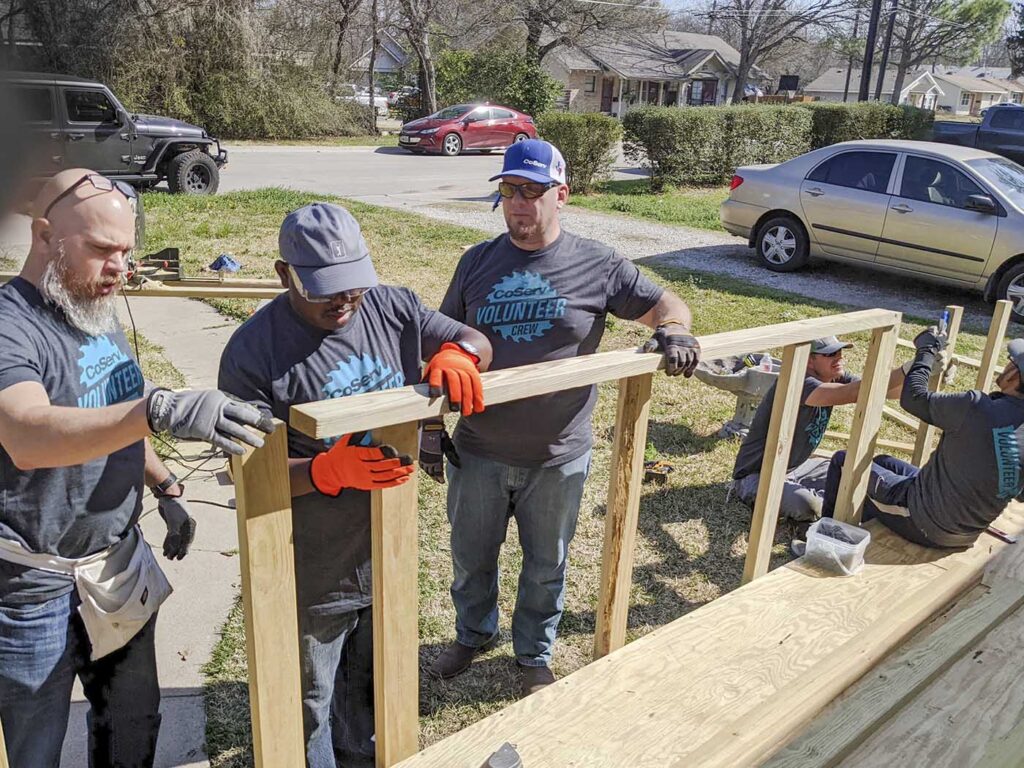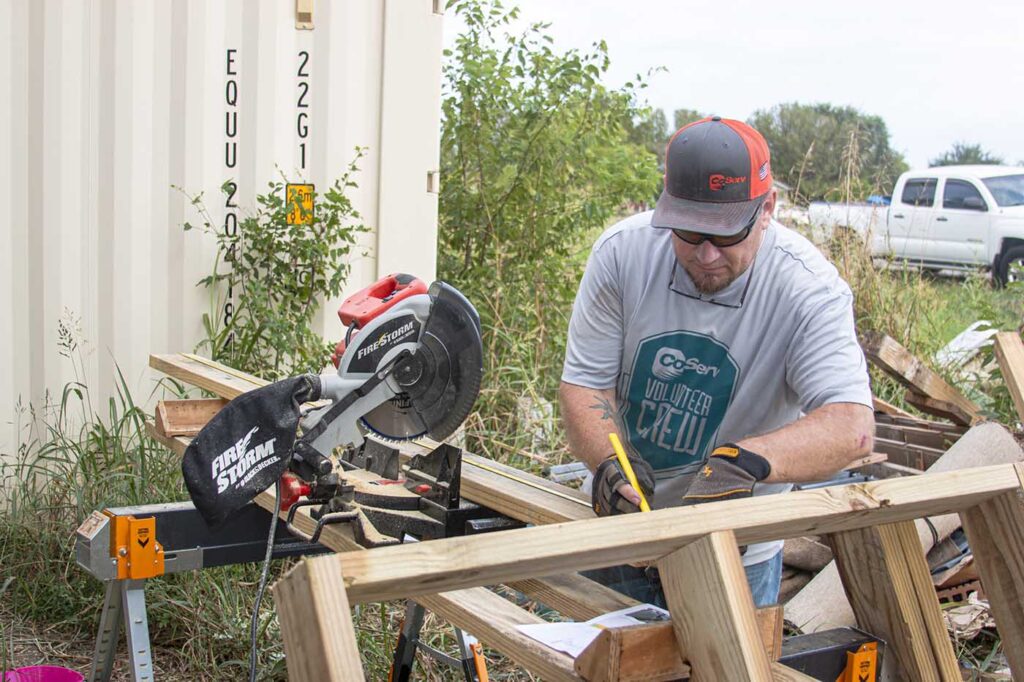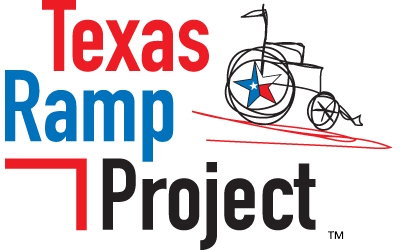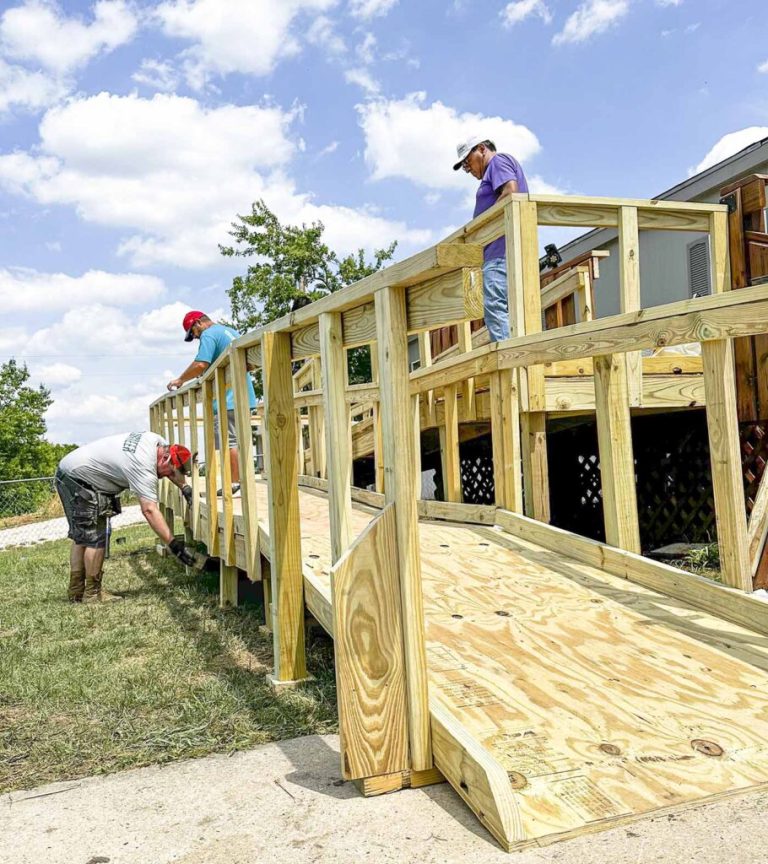It’s amazing how a stack of 2x4s, some plywood and a labor of love can equate to freedom.
But that is the blissful result for dozens of electric cooperative members in Texas who have new mobility in their lives, thanks to an accessibility ramp project championed by CoServ and other co-ops.
Working with the Texas Ramp Project, volunteers and DIYers from Corinth-based CoServ are nearing their 40th ramp since 2017. The response from appreciative members says it all, such as the build for a woman in Argyle with a double amputation.
“Before she had the ramp, her son had to come over, pick her up and carry her out of her home,” said CoServ Client Services Manager Conan Tearney, liaison to the Texas Ramp Project.
“We got the ramp and the look on her face was as though she got her freedom back. Before that, she wasn’t able to go outside and check her mail. Now she could. That really stuck with me,” he said.
The Texas Ramp Project is a statewide initiative to provide wheelchair ramps, with an emphasis on the elderly or individuals with mobility limitations who can’t afford the cost. Ramps can run into the thousands of dollars, such as a 72-foot-long ramp built by a team from CoServ on a steeply graded walkway in Denton.

Electric co-ops are one source of funding for the Texas Ramp Project with about a dozen as major sponsors and longtime donors.
For its part, the CoServ Charitable Foundation has donated about $71,000 to the Texas Ramp Project through Operation Roundup, which enables member donations by rounding bills to the next highest dollar. A recent $10,000 contribution from the CoServ Charitable Foundation will underwrite supplies for additional ramps in North Texas.
It’s the elbow grease, though, that brings a special measure of satisfaction to project volunteers and recipients, as in the case of a Lake Dallas resident confined to her home for months because of an autoimmune disease.
A CoServ team built a 48-foot-long ramp for Jamie Taylor last fall. “It’s going to be able to get her out of the house and down the ramp so we can get her to the doctor appointments for the medicine and treatments that she needs,” said her husband, Matt Taylor.
A small group of veterans at CoServ got involved in building ramps when the CoServ Charitable Foundation provided its initial grant to the project.
“They said, ‘Hey would you be interested in joining us on a build?’” Tearney recalled. “We took them up on that and built our first ramp more than six years ago. Since then, we’re almost 40 ramps in and I love that we do it.”
Typically, Tearney receives referrals from the Texas Ramp Project, incorporated in 2006, which works with medical providers, caregivers and others to identify potential recipients.
He then meets with the homeowner to review the project, take pictures, conduct measurements and ensure that construction will meet the standards of the Americans with Disabilities Act. If the Texas Ramp Project approves the request, Tearney rounds up a group of five to 10 CoServ volunteers for a future Saturday cutting lumber and piecing together a ramp with materials delivered by the ramp project.

Depending on the degree of difficulty, the work could take a few hours to all day. For every inch of height, the ramp needs to extend for a foot, so a porch with two steps of five inches each would require a 10-foot-ramp.
“A lot of these are in mobile homes, so you’re talking about a 40-, 50-, 60-foot ramp,” Tearney said. “I think the longest one we did was eight hours.”
No experience? No problem.
“We’ve had people that range from never held a power tool to people that are DIYers and find it as an opportunity to use every tool in their garage,” he said.
“If you don’t have the skills, at least half of us have done this before. There is always a core group of us who have built, and we’re more than happy to show the new folks how to do it. We always get ‘Wow, that was great, and it wasn’t as hard as I thought it was going to be.’”
Tearney said the CoServ team is aiming for a ramp per quarter in 2024.
“We do a lot of other good things and initiatives, but this is special and the support from the cooperative enables us to do it,” Tearney said. “We’re a co-op, so it’s always about giving back to the community.”
National Rural Electric Cooperative Association, by Steven Johnson, Contributing Writer for NRECA.

